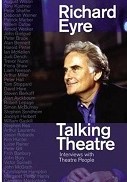| Directors Talk Brecht |
Theatre Writer Book |
| Richard Eyre “Talking Theatre” , Nick Hern Books , October 8, 2009 |
 “Talking Theatre” comprises 42 interviews across the spectrum of theatre. That spectrum includes nine directors. Richard Eyre focuses in particular on the influence of key figures, Shakespeare, Brecht, Beckett and Edward Gordon Craig. Eyre is an interviewer of skill who invariably brings out an articulateness and high quality of expression from his respondents.
“Talking Theatre” comprises 42 interviews across the spectrum of theatre. That spectrum includes nine directors. Richard Eyre focuses in particular on the influence of key figures, Shakespeare, Brecht, Beckett and Edward Gordon Craig. Eyre is an interviewer of skill who invariably brings out an articulateness and high quality of expression from his respondents.Eyre poses the question. “If Beckett wasn't a pessimist, was Brecht a wilful optimist?” Peter Brook gets to an essence of Brecht in his response. “Brecht was full of contradictions. Whatever you say about Brecht you can find the opposite. Any good thing you can say about Brecht you can find the opposite. Any good thing you can say about Brecht you'll find something bad: anything bad you say about him you can compensate it with something good. “Wilful optimist” is absolutely right.” Brook picks out convincingly the factors for the last chapter of the life. “Of course he wanted his theatre. He was very aware of the fact that he was a magnificent director; he didn't want to stay liked in America merely as a writer and a theorist. He knew that to do the directing that he wanted to do, he had to have all the elements. He had to have his actors, his theatre, in his own social surroundings. So, of course, he did everything, against great difficulty, to have this theatre, and, at the same time, he very shrewdly kept a certain distance so that he wasn't officially the person who could be attacked. But he was attacked and had great difficulty all the time.” Brook is a director and is unequivocal in determining Brecht's principal achievement. “The work was truly of an ensemble of unique richness with an absolute perfection of living stage craft. For me, Brecht was and still is much more fascinating as a great theatre director than as a playwright.” In interview with Peter Hall Richard Eyre points out that 1955 and 1956 were years of two events. The visit to London of the Berliner Ensemble near-coincided with Hall's directing “Waiting for Godot.” Hall too homes in on Brecht the director. “What Brecht brought to us was passionate advocacy of the fact that what you put on the stage has to be necessary...Brecht made us understand that to put an object on a stage there had to be a reason for it to be there, that decoration was actually irrelevant and misleading.” William Gaskill, the most Brechtian of British directors, says the same. “I learned most of all the use of space, the sense of the empty stage, that everything on the stage should be essential, and there should be nothing unnecessary, which didn't mean it shouldn't be rich or colourful or vital.” John McGrath is harsh on the politics but picks out the paradox. “The aesthetics were the aesthetics of a kind of historical epic, which was very exciting on one hand- good narrative qualities, very striking theatrical images- but with curiously little relationship to either his politics or his philosophy as far as I could tell. They seemed to just exist because he had huge theatrical instinct.” Simon McBurney returns to this and Peter Brook's theme of the ambivalence within Brecht. “Brecht is a very paradoxical figure. Very ambivalent, very dare I say it, twentieth century. With all the lies and games of a twentieth century artist. We don't know exactly where Brecht is telling the truth and where he isn't. And indeed the truth changed for him over the whole of his life. He started working in cabaret, and he ended up with the Berliner Ensemble. The difficulty with Brecht, in a sense, has occurred after the end of his life, because people take what he says as law. And the moment you apply law, something dies, and then you get the Brecht police.” |
Reviewed by: Adam Somerset |
This review has been read 1475 times There are 34 other reviews of productions with this title in our database:
|
